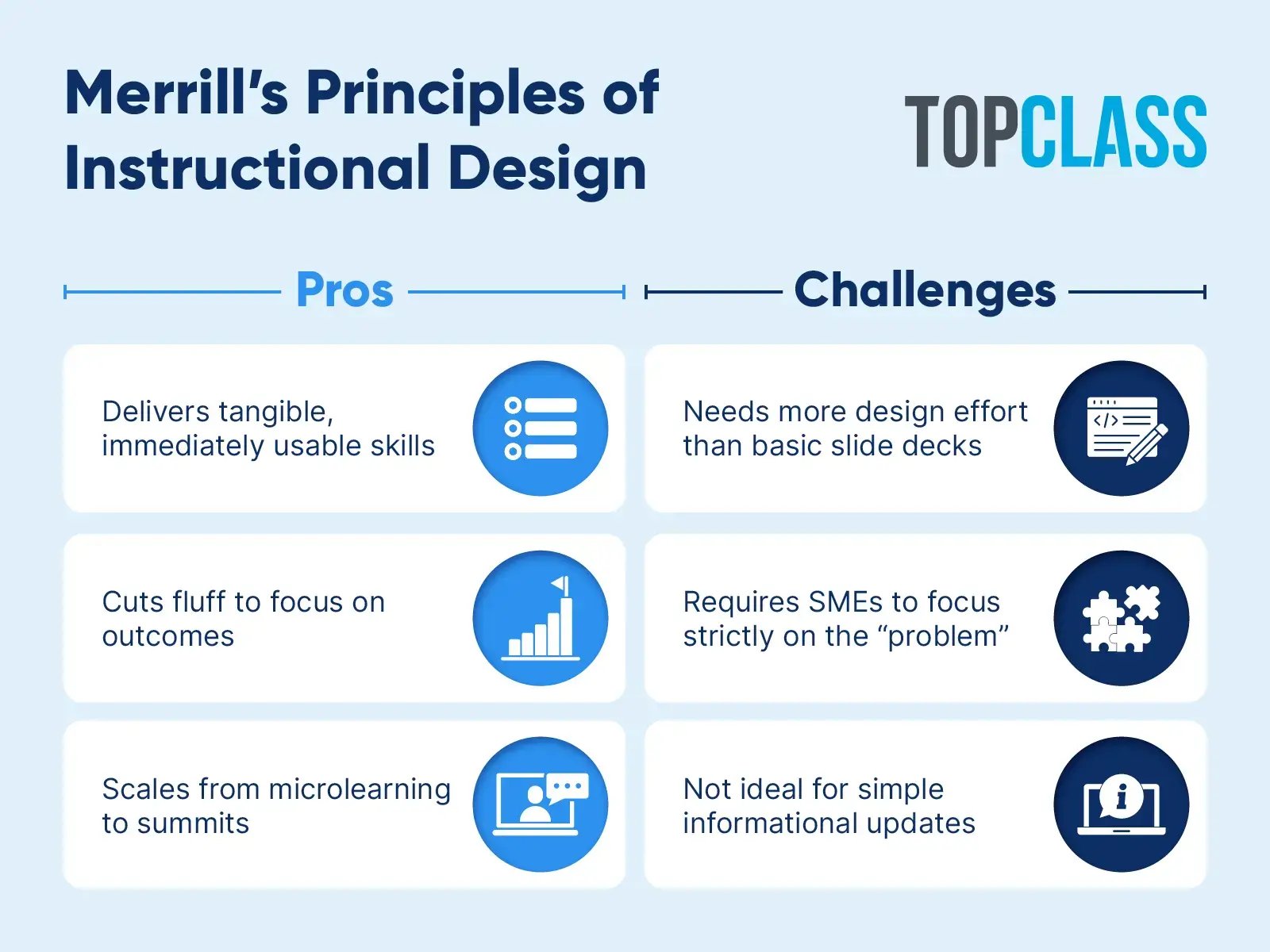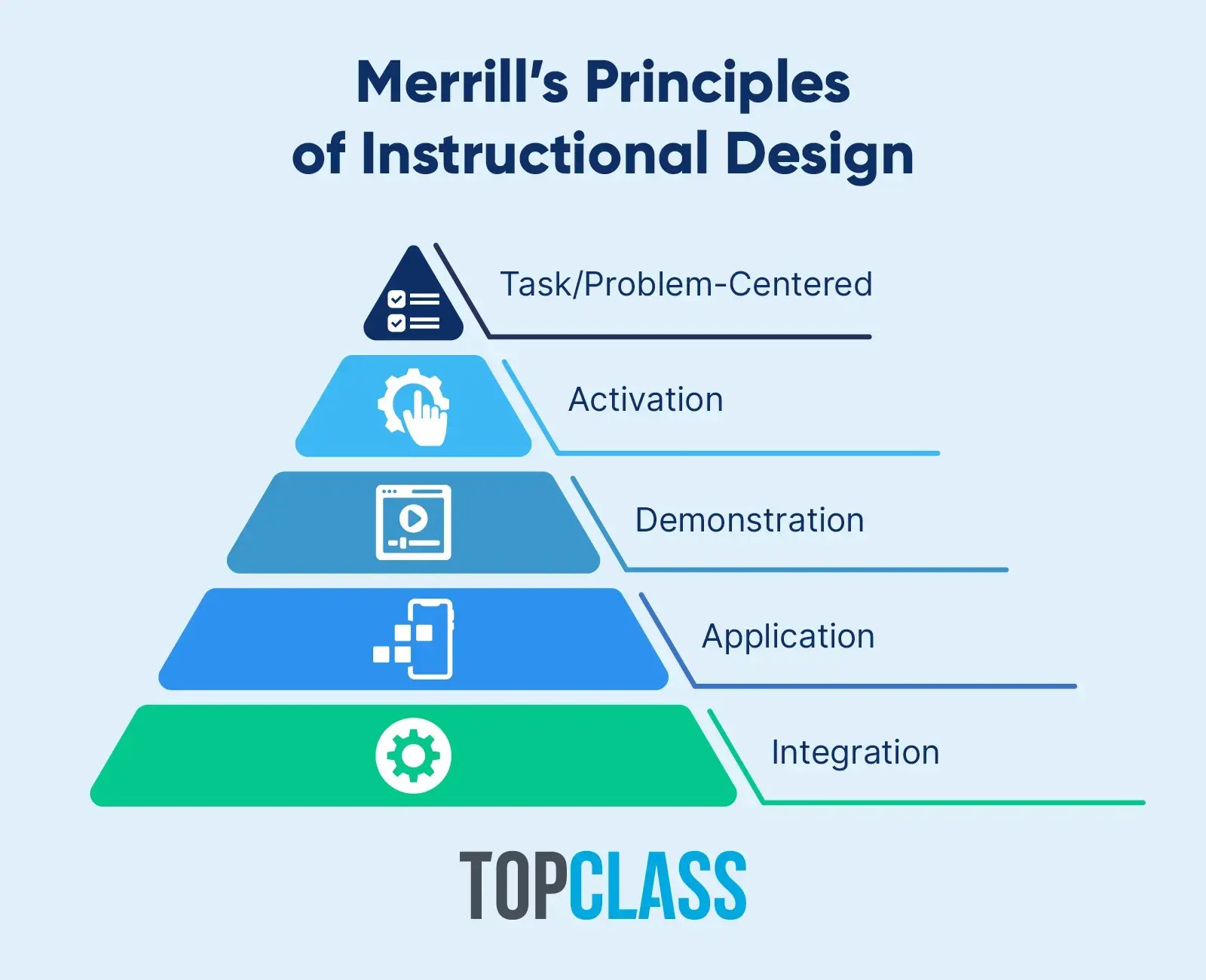
Merrill's Principles of Instruction: Ignite Active Learning
If you manage professional education, you know that the gap between "attending a course" and "mastering a skill" is wide. Merrill's principles of instruction provide the bridge. While many frameworks feel like academic theory, Merrill's model addresses how learners process, retain, and apply new knowledge in high-stakes environments.
Developed by educational researcher M. David Merrill, Merrill's principles of instruction are rooted in real-world problem-solving. When your educational programs follow this blueprint, learners don't just consume information; they gain the competence to apply it immediately. To help you apply this instructional model, we'll cover the following:
- Merrill's Principles of Instruction FAQ
- Breaking Down Merrill's Principles of Instructional Design
- Leveraging Merrill's Principles of Instruction in eLearning
- How Merrill's Principles of Instruction Align With Other Instructional Design Models
Let's explore how to use Merrill's framework—backed by the right learning management system (LMS)—to ensure your members can apply what they've learned.
Merrill's Principles of Instruction FAQ
Mastering Merrill's principles of instruction allows your courses to move beyond content delivery and toward true skill mastery. These FAQs address common questions about the framework's practical benefits and how to adapt it for the fast-paced world of association learning.
What Are Merrill's Principles of Instructional Design?
Merrill's principles are an instructional theory composed of five task-centered phases designed to maximize how learners acquire and retain new skills. These phases include:
- Task/Problem-Centered: Learning begins with a real-world task or problem the learner encounters in their day-to-day life (e.g., their job).
- Activation: Learners connect new information to their existing knowledge and past experiences.
- Demonstration: The instructor shows—rather than just tells—how to solve the problem using worked examples.
- Application: Learners practice the new skill and receive feedback in a controlled environment.
- Integration: Learners adapt and apply the skill to their actual professional life.
Unlike models that focus on how to deliver content, Merrill's principles of instruction focus on how to structure the learning experience around real-world tasks. By centering the curriculum on a specific problem the learner needs to solve, this framework ensures that every piece of information provided is relevant and actionable.
Here's a video from Dr. Merrill explaining his perspective:
What Are The Pros And Cons Of Merrill's Principles of Instruction?
To help your association decide if this model is right for your learning program, here is a breakdown of the benefits and challenges of Merrill's principles of instruction.

The Pros for Associations:
- Results-Oriented: Because the model starts and ends with a real-world task, learners walk away with a tangible skill they can use immediately. This creates a high ROI for your education and certification programs.
- Eliminates "Content Bloat": By focusing strictly on what's needed to solve a problem, you cut out unnecessary fluff. This makes your courses shorter, more engaging, and more respectful of members' time.
- Scalability: While it sounds complex, the five-phase cycle is remarkably flexible. You can apply it to a 10-minute microlearning video or a multi-day executive leadership summit.
The Challenges:
- Upfront Design Effort: Creating a problem-centered course requires more initial thought than a standard slide deck. Identifying the specific professional challenges your members face takes time.
- Requires SME Discipline: Subject Matter Experts (SMEs) often want to share everything they know. Keeping them focused strictly on the "problem" requires an instructional designer to act as a firm editor and guide.
- Not Ideal for "Information Only" Content: If your goal is simply to distribute a policy update or a high-level announcement without any practical application, Merrill's framework may provide more structure than you actually need.
The challenges of this model—mainly the development time—are usually offset by increased member satisfaction. When members realize your courses actually help them do their jobs better, they are far more likely to renew their membership and recommend your programs to others.
Can My Association Apply Merrill's Principles to Short eLearning Opportunities?
Yes, you can adapt Merrill’s principles of instructional design to shorter educational opportunities. Whether you're creating an asynchronous certification course or a live 30-minute webinar, you can follow the cycle: start with a real-world member problem, activate their experience with a quick poll, demonstrate a 5-minute solution, let them apply it via a chat-based exercise, and close with an integration "homework" prompt for their workday.
Breaking Down Merrill's Principles of Instructional Design
Merrill believes the following five distinct phases must occur for effective learning to take place. If any of these "gears" are missing, the instructional engine stalls. Let's break down how each phase transforms a passive observer into an active problem-solver.

1. Task/Problem-Centered
In his explainer video, Dr. Merrill stated, "Truly effective learning experiences are rooted in problem-solving." For associations, this is an ethical and practical choice; it ensures your programs are worth a member's time and money. By centering a course on a relevant, high-stakes problem, you immediately capture a learner's interest and engage their professional curiosity.
2. Activation
Before introducing new concepts, you must trigger the learner's existing knowledge. You can do this by relating new information to their past professional experiences. This helps them build a mental bridge from what they know to what they are about to learn. If they lack prior experience, provide a foundational mental model or a basic case study before introducing complex theories.
3. Demonstration
Dr. Merrill said, "Educators must show vs. tell." At this stage, learners are observers. To be effective, you must provide multiple relevant examples. Depending on the skill, use videos, infographics, or role-playing to:
- Visualize procedures. Walk through step-by-step processes in real or simulated situations.
- Highlight risks. Point out conditions, consequences, and various possibilities.
- Offer multiple perspectives. One example is rarely enough. Show how the solution works across different contexts or at progressively more complex levels.
4. Application
Merrill believed that simple multiple-choice quizzes are insufficient for true mastery. True application requires the learner to actually do the work in the context of a real-world problem.
Help learners apply new knowledge and learn from any mistakes. Provide guidance at the start and then gradually reduce support.
Retrieval practice is an example of the application principle. Activities such as quizzes, role-playing, reflection, and discussion provide opportunities for the learner to retrieve and apply new knowledge. Merrill recommended exercises that allow the learner to apply new knowledge in different scenarios. Here's how that might look:
- Scaffolding: Provide heavy guidance at the start, then gradually fade that support as learners gain confidence.
- Active Retrieval: Incorporate exercises, simulations, and pee
- Diagnostic Practice: Challenge learners to recognize errors, predict consequences, and diagnose unexpected results.
5. Integration
The true test of an educational program is whether the knowledge survives the transition back to the workplace. Integration is where theory becomes a permanent professional habit. Give your members opportunities to:
- Reflect on the new knowledge and discuss or write about how they will use it at work.
- Try out the new practice/skill at work and report back on positive results or employer recognition.
- Collaborate with peers on a task or solve a problem together using what they’ve learned.
- Teach someone else what they’ve learned.
- Present what they’ve learned in a setting such as a lunch-and-learn.
When members successfully weave these new skills into their daily routines, your training becomes a vital career asset. This final phase ultimately drives measurable ROI for your members (e.g., better workplace performance, compensation, promotions) and cements the value of your association’s educational offerings.
Leveraging Merrill's Principles of Instruction in eLearning
While Merrill's principles provide the pedagogical blueprint, the right technology brings that design to life. To implement this framework at scale, you need a digital environment that supports interactivity. A modern association LMS like TopClass acts as the engine for Merrill's principles of instruction, transforming static content into an interactive learning cycle.

By leveraging built-in platform features, you can scale the phases to thousands of members:
- Scenarios and Branching: Drop learners into real-world challenges to satisfy the Problem-Centered and Activation phases.
- Multimedia Tools: Use video and interactive walk-throughs to provide a clear demonstration of new skills.
- Interactive Assessments: Provide sandbox environments or case studies for immediate application with automated feedback.
- Social Learning: Use forums and peer-review tools to help members complete the Integration phase by sharing real-world successes.
By using an LMS to automate these steps, your association can move from simply hosting videos to delivering a high-value, competency-based education program.
How Merrill's Principles of Instruction Align With Other Instructional Design Models
Instructional designers rarely use just one framework. While Merrill's principles of instruction focus on the "how" of the learning experience, they work in perfect harmony with the other models in our Learning Science Made Easy series:
- Gagne's Nine Events of Instruction (The Process)
- Bloom's Taxonomy (The Objectives)
- ADDIE (The Lifecycle)
- Retrieval Practice (The Memory)
For instance, you might use ADDIE to manage the overall project lifecycle (Analysis, Design, Development, Implementation, and Evaluation) while using Merrill's principles to design the actual learning activities.
Similarly, while Bloom's Taxonomy helps you define your learning objectives (identifying if a learner needs to remember or evaluate), Merrill's model provides the vehicle to reach those goals through problem-solving.
The most direct alignment is between Merrill and Gagne's Nine Events of Instruction. While Gagne focuses on the mental conditions required for learning, Merrill provides the task-centered structure. Here is how the two frameworks compare to one another:
- Merrill's Activation phase aligns with Gagne's first three events: grab the learner's attention, explain the objective, and stimulate recall of prior learning.
- Demonstration relates to Gagne's fourth and fifth events: present the content and provide learning guidance.
- Application aligns with Gagne's sixth, seventh, and eighth events: give learners the opportunity to practice, provide timely and specific feedback, and assess performance.
- Integration relates to Gagne's ninth event: enhance retention and transfer.
By understanding how these frameworks overlap, you can choose the right tool for each stage of the design process. Using Merrill's principles of instruction as your core delivery method ensures that, regardless of which model you use, your content remains focused on practical application and learner success.
Helpful Resources
If you've ever attended a dynamic workshop where the instructor related new info to your experience, showed you how it worked, and let you try it yourself, you've seen Merrill's principles of instruction in action.
While your SMEs and session presenters may not be adult learning scientists, you can provide Merrill’s framework as a simple, high-impact checklist. It ensures they transform even the most academic presentation into a practical, problem-solving session that delivers immediate value. By grounding your education strategy in these five principles, you help members build the professional competence needed to thrive.
To continue improving your association's education offerings, explore these resources:
- Learning Management Systems for Nonprofits: A One-Stop Guide. Discover how to select and use the ideal platform to streamline your mission-driven education and volunteer training programs.
- The Only LMS Implementation Checklist You Need: 9 Easy Steps. Navigate your learning platform launch with confidence using this roadmap.
- What Are LMS Integrations? A Guide + Integrations You Need. Learn how to connect your learning platform with your existing tech stack to automate workflows and create a unified educational experience.



